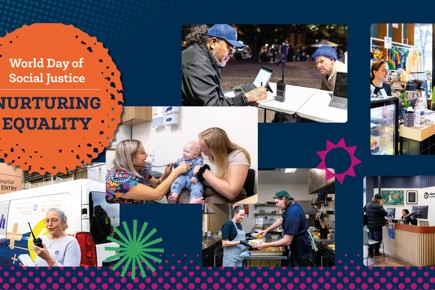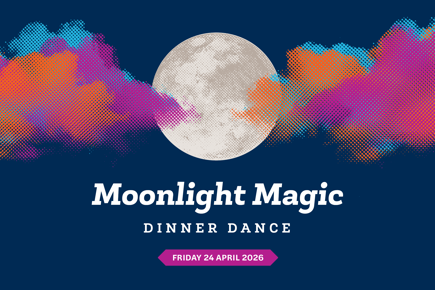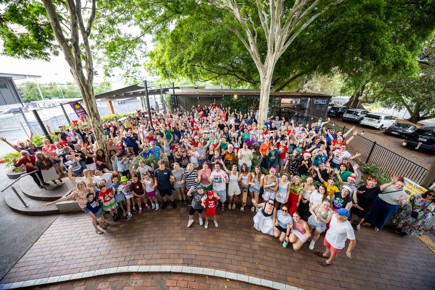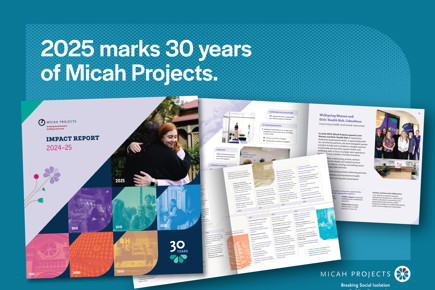Family homelessness is rising – and it’s closer to home than you think. In Brisbane, hundreds of families are living in motels, cars and couch surfing, looking and waiting for a safe place to call home.
Over 30 years working alongside the Brisbane community, Micah Projects has seen that, when people don't have a safe and secure home, it is so hard to maintain a stable life, and even harder to look to a future with hope – something every adult and child deserves.
Read these evidence-based insights to help learn the scale of the crisis. With these facts we can fuel meaningful conversations with family, friends and colleagues.
Hundreds of families in Brisbane are in crisis right now
Micah Projects is currently supporting more than 260 families—including over 500 children—in crisis accommodation across Brisbane.
- In just 18 months, the number of families facing homelessness in Brisbane has nearly tripled.
- Families often spend over 12 months in motels, with no kitchen, laundry, or privacy, while waiting for affordable or social housing.
- As of September 2025, Queensland's social housing waitlist reached a record high of more than 52,000 people – meaning more demand than available homes.
Learn more:
📖 The hidden reality of family homelessness in Brisbane | Micah Projects
Domestic and family violence is a leading cause of homelessness
Women and children escaping violence often lose housing, income, and community support. We see women and children who are needing to find safety, choosing to stay in violent relationships due to the housing crisis. They have nowhere to go and nowhere to stay.
Data from Brisbane Zero, a local collaboration of 16 community services organisations, shows:
- 68% of the families experiencing homelessness in 2024-25 and surveyed by Brisbane Zero left or lost housing due to violence in the home
- 1,230 families experienced homelessness in the past year
- 77% were newly homeless; 75% were sole parenting women
- 2,125 children were affected—48% aged 5–12
Micah Projects’ Brisbane Domestic Violence Service provides support, housing pathways, and trauma-informed care, and works alongside people seeking help and social services to offer wrap-around support.
Learn more:
1 in 6 children live below the poverty line in Australia in 2025 and Brisbane Zero survey data shows that 49% of families experiencing homelessness don’t have enough money to take care of day-to-day needs.
Homelessness and poverty have lifelong impacts on kids
Family homelessness violates children’s rights to safety, education, and development. In Brisbane, we see parents trying to navigate daily living from temporary accommodation, trying to hold their families together. We see the impact and the stress every day, alongside the lifelong impacts on kids.
A recent evaluation of Micah Projects Healthy and Safe Start Program for local pregnant and parenting women found that women experiencing homelessness often face barriers to accessing timely support. This support can make a huge difference in the life of children, as seen in research around the first 2000 days (from conception to five years) of a child’s life.
Learn more:
📖 The Every Child, Every Woman: Healthy and Safe Start program | Micah Projects
📖 The First 2000 Days | Micah Projects
Poverty is rising— and the housing crisis is worsening
1 in 6 children live below the poverty line in Australia in 2025 and Brisbane Zero survey data shows that 49% of families experiencing homelessness don’t have enough money to take care of day-to-day needs.
In Brisbane, we see the combination of increased poverty and reduced availability of affordable and social housing as the other major driver for family homelessness. Income support rates fall far short of covering rent, food, and essentials, especially in Brisbane’s tight housing market—and the human impact that we see is far more alarming than the data can convey.
At Micah Projects, we connect families with available crisis accommodation and provide wrap-around support – food and daily living essentials, advocacy, as well as health, social and support services to respond to the needs of people who face the challenge of not being able to access permanent, affordable or social housing. This work happens right across all our services – from our Homelessness Hub in West End and through our outreach services across the Brisbane community, as well as through referrals, services and partners who we work together with.
Learn more:
📖 Inadequate income support leaves people in poverty - ACOSS
📖 Poverty increases to 1 in 7 people - ACOSS
📖 Brisbane Zero FY24–25 Family Snapshot
📖 Brisbane Zero Data Dashboard
Housing first, and with support, is proven to work
Micah Projects champions two approaches that are proven to reduce homelessness: Housing First restores dignity, and Supportive Housing breaks the cycle.
The Housing First approach prioritising housing as the foundation for recovery, stability, and dignity. This means people don’t have to ‘earn’ housing through treatment or compliance; people are housed first, then supported to make the lasting changes they need for a stable life. We continue to see that when people don't have a safe and secure home, it is hard to maintain a stable life and even harder to look to a future with hope, which is something every adult and child deserves.
The second approach is Supportive Housing, which combines affordable housing with wrap-around supports. Brisbane Common Ground is evidence that this works. As Queensland’s first supportive housing site, it provides permanent homes with onsite support for people who’ve experienced chronic homelessness. The results speak for themselves:
- Tenants report improved wellbeing, reduced hospital visits, and sustained tenancies
- According to 2023 research, the annual cost offset of moving someone from chronic homelessness to being securely housed would be more than $17,000 – that’s public costs saved by preventing expenses across health, justice, and homelessness services.
Learn more:
🎥 Watch our homelessness outreach team talk about housing first
Community action makes a difference
Case studies around the world, and lessons from Micah Projects’ 30 years working in the community have proven that shared responsibility and community action, alongside evidence-based approaches and more housing, are the keys to solving homelessness and restoring justice to our communities.
Please give your support and your voice to our shared community response to homelessness.
Learn more:

Share these facts. Start a conversation. Support the movement
Support Families in CrisisHomelessness is solvable, but it takes all of us.
Stay up to date on our website Micah Projects News and Events and subscribe for monthly updates.
Keep reading
-

World Day of Social Justice : Nurturing Equality News
Today, the United Nations marks World Day of Social Justice, a moment that invites all of us to pause and ask: what does justice really look like in our own community?
Domestic and Family Violence ServicesSocial Enterprise and Community ConnectionHousing and Homelessness ServicesInclusive Health PartnershipsLotus ServicesSupportive HousingSystems Leadership and AdvocacyWellspring ServicesWomen, Children and FamiliesWomen and Girls Health Hub -

19th Annual Moonlight Magic Dinner Dance Event
Join us Friday 24 April to enjoy a delicious two-course meal and celebrate community spirit and inclusivity, at our Annual Moonlight Magic Dinner Dance.
Domestic and Family Violence ServicesSocial Enterprise and Community ConnectionHousing and Homelessness ServicesInclusive Health PartnershipsLotus ServicesSupportive HousingSystems Leadership and AdvocacyWellspring ServicesWomen, Children and FamiliesWomen and Girls Health Hub -

2025 Micah Projects' Annual Christmas Hamper Appeal News
$36,720.51 raised and 19,974 items have been collected, packed and delivered through the Micah Projects’ Annual Christmas Hamper Appeal.
Domestic and Family Violence ServicesSocial Enterprise and Community ConnectionHousing and Homelessness ServicesInclusive Health PartnershipsLotus ServicesSupportive HousingSystems Leadership and AdvocacyWellspring ServicesWomen, Children and Families -

2025 AGM and Annual Dinner News
On Monday 10 November, we held our AGM and annual dinner. We were honoured to be joined by our board, members, partners, supporters, collaborators and our staff and to present our 2024-25 Impact Report.
Domestic and Family Violence ServicesSocial Enterprise and Community ConnectionHousing and Homelessness ServicesInclusive Health PartnershipsLotus ServicesSupportive HousingSystems Leadership and AdvocacyWellspring ServicesWomen, Children and Families